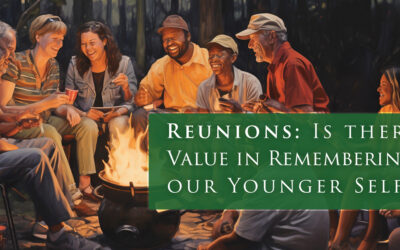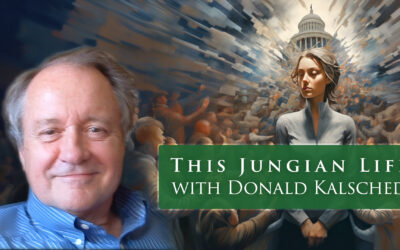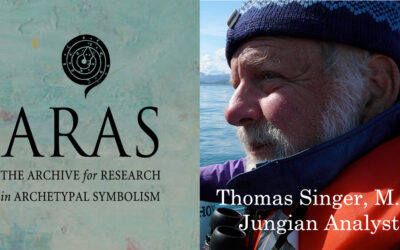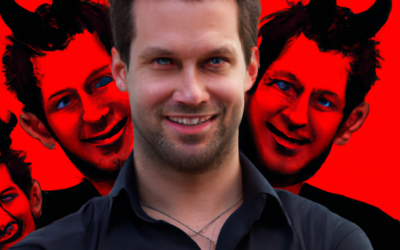Fame tempts the ego to claim what does not belong to it, and the person may become identified with his or her role, especially as others have an urge to find a hero, wise man, leader, or transcendent figure. Jung wrote about the mana personality—a larger-than-life person with charismatic power and energy. Magicians and priests, infused with special knowledge and god-like capabilities, are emblematic of mana personalities. Followers are then imbued with the mana person’s special qualities, as we see in audience reactions at concerts or rallies.
REUNIONS: Is there value in remembering our younger selves?
Oct 12, 2023
We organize reunions because we yearn to reconnect with old friends, recall shared experiences, and reignite a sense of community. We all need meaningful social contact and enjoy nostalgia. While coming together can feel alluring, actually attending the event may evoke a spectrum of ambivalent feelings. We’re likely to feel judged for our achievements, appearance, or socioeconomic status, especially compared to our peers. Transitioning into adulthood is often tumultuous, marked by intense negative experiences, and revisiting those periods can be daunting. Attending reunions can inadvertently reactivate traumatic memories, making the decision to participate a delicate one for many of us. Seeing a former bully or revisiting a dorm can bring back the anxiety, fear, loneliness, or sadness of those formative years. We might even find ourselves sweating or feeling trapped. Recognizing and validating our fears is crucial.
Donald Kalsched – Can running our minds like a democracy save us?
Oct 5, 2023
Jung discovered our inner world is populated by various imaginal figures representing powerful psychological forces. If we treat our minds as democratic spaces, it can safeguard us from internal and external authoritarian influences.
THE BARBIE MOVIE: Can it Dismantle an American Myth?
Sep 7, 2023
In 1959, the Barbie doll hit the market and created a stir. American mothers objected to her sensuous form, so Mattel marketed it directly to children, a tactic never used before, and it worked. The maternal archetype of Hera, sentinel of the social order, goddess of childbirth, and protectress of the home, was supplanted. Aphrodite, the captivating goddess exuding an aura of beauty, desirability, and persuasive allure, had arrived.
FRIEND or FOE: The AI Debate with Michael L. Littman, PhD
Aug 3, 2023
The uses and abuses of ChatGBT artificial intelligence language model have taken the collective imagination by storm. Apocalyptic predictions of the singularity, when technology becomes uncontrollable and irreversible, frighten us as we imagine a future where human intelligence is irrelevant. Prof. Michael Littman joins us to contextualize the advancement of artificial intelligence and debunk the paranoid rhetoric littering the public discourse.
Meeting Shadow on the Spiritual Path with Connie Zweig
Jul 20, 2023
Award-winning author, depth psychotherapist, and guide Connie Zweig shows us encountering darkness is a necessary part of our spiritual journey. In the first half of life, we disown aspects of ourselves to fit in and navigate our world more smoothly. Over time we realize all aspects of ourselves must be recalled and befriended. Integration of these shadow aspects lays the foundation for spiritual awakening.
Reviving Tolerance in Cancel Culture
Jul 13, 2023
In a world reduced to digital exchanges and swift judgments, reviving tolerance has become vital. Toleration comes from the ancient Proto-Indo-European root meaning “to carry,” a capacity collapsing in current culture. We stumble into extremes when we lose the strength to carry the tension of opposite ideas and feelings. Exaggerations of discomfort and hyperbolic comparisons pepper media messages and inflame the underinformed public–the collective psyche lists from topic to topic. In the vertigo of confusion, we make terrible decisions and strike out blindly.
EMBRACING THE OUTCAST: Understanding Homelessness
Jun 8, 2023
Homeless symbolizes a state of disconnection, both externally and internally. It is a complex interplay between unconscious, personal experiences, and societal forces. Resolving displacement involves restoring a sense of security, belonging, and acceptance in the outer world and oneself.
It transcends the absence of physical shelter and ventures into spiritual and emotional displacement. It mirrors the alienation and dislocation experienced in a rapidly evolving society, where individuals feel lost amidst the tumultuous tides of change. In this symbolic homelessness, we recognize our collective vulnerability and insecurity. Homelessness is not a homogeneous phenomenon. It ranges from temporarily unsheltered individuals between jobs or homes to chronically homeless individuals who spend years or decades without stable housing. The psychological implications differ substantially across these spectrums and demand a nuanced understanding.
ARCHETYPAL IMAGES: the soul’s language
May 11, 2023
If we envision archetypes as cosmic blueprints, then archetypal images are the tangible expressions that emerge from this transcendental plan. They are the houses built upon the foundation of archetypes, manifesting in a multitude of forms while remaining interconnected through their shared universal design. Separating archetypes and their imagery clarifies how one gives rise to the other yet remains distinct.
MEDUSA’S MANY FACES: the evolution of a myth
May 4, 2023
The symbolism of Medusa, one of the three Gorgon sisters in Greek mythology, has captivated and perplexed the imagination of artists, writers, and philosophers for centuries. Originally depicted as a monstrous creature with snakes for hair and the ability to turn onlookers to stone, Medusa has undergone a remarkable transformation.
THE DARK TRIAD: tracking wolves in our midst
Apr 27, 2023
Understanding the Dark Triad can help us navigate mysteriously troubled relationships in all spheres of life. Psychologists coined the term to describe a trifecta of malevolent personality traits: narcissism, machiavellianism, and psychopathy. Although less sinister than any one full-blown personality disorder, it still affects the soul plagued by it and those in reach of its host.
SYMBOLIC MEANING of HAIR: what’s your look saying?
Apr 20, 2023
In current times it is an expressive medium that each of us shapes to silently communicate our attitudes toward self and others. What do you want your hair to say? Heading out on the town with bed-head might display a carefree indifference to others’ judgments. A carefully quaffed style on prom night might say, “I’m a mature adult now.” Tracing hair’s influence helps us understand underlying psychological patterns that inform our understanding of this powerful symbol.











